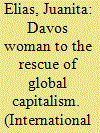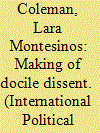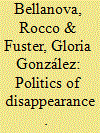|
|
|
Sort Order |
|
|
|
Items / Page
|
|
|
|
|
|
|
| Srl | Item |
| 1 |
ID:
124453


|
|
|
|
|
| Publication |
2013.
|
| Summary/Abstract |
The World Economic Forum (WEF) is a global governance actor that has in recent years taken an increased interest in issues pertaining to gender equality and women's empowerment. The paper critically investigates the work of the WEF in this area, suggesting that WEF-produced gender and development discourse is profoundly compatible with the politics and practices of neoliberalism-not least in the way in which it aligns gender equality and women's empowerment with national economic competitiveness. This is, furthermore, a distinctly postfeminist reading of gender that rests upon the production of neoliberal-compatible female subjectivities-such as "rational economic woman" or "Davos woman"-who emerge as those in society best able to deliver fair and sustainable economic growth (effectively rescuing global capitalism from the excesses of hypermasculine crisis capitalism). The framing of the case for gender equality and women's empowerment in these terms is powerful and may well be an effective way for gender advocates to present their demands. But by analyzing not only how the WEF has framed/represented gender issues but also what has been left out of this representation, the paper points to the way in which simplistic representations concerning the contribution that women make to economic competitiveness disguise the double burdens and gendered structures of socioeconomic inequality that are central to the widening and deepening of the market into all spheres of social life under conditions of roll-back neoliberalism.
|
|
|
|
|
|
|
|
|
|
|
|
|
|
|
|
| 2 |
ID:
124447


|
|
|
|
|
| Publication |
2013.
|
| Summary/Abstract |
This article explores some basic issues which arise from International Relations (IR) theory also being a form of social theory in a broader sense. Many of these issues are related to the question of a "social whole," that is, whether international relations/International Relations is one of many parts of a social whole, on what grounds it is differentiated from other parts, and whether it operates on a distinct level of social reality. We argue that these questions have been addressed in many forms of IR theory, but mostly only implicitly, and that the failure to make explicit assumptions about a social whole is probably due to the relative neglect of the subject in modern Sociology. The article argues that implicit assumptions about a social whole can be unearthed by looking at the concepts of systems, levels, and sectors, discussing debates about each of these in turn. Openly addressing IR theory as social theory, and spelling out images of a social whole, allows one to gain a sharper understanding of some of the basic analytical categories used, and to judge whether they form plausible delimitations of social reality within a wider social context.
|
|
|
|
|
|
|
|
|
|
|
|
|
|
|
|
| 3 |
ID:
124455


|
|
|
|
|
| Publication |
2013.
|
| Summary/Abstract |
This study is about strategies of neoliberalization in relation to practices of dissent and resistance. It explores how struggles arising in the context of neoliberalization may be subject to entanglement within the very processes they seek to contest and-in so doing-interrogates the political stakes of neoliberal governmental rationality. Drawing upon extensive ethnographic research, I trace the international trajectory of mobilizations against the dispossession visited upon Colombian farmers in the context of BP's investment in oilfields in the mid-1990s. Reasoning through attention to the ways in which this one specific struggle was neutralized, I suggest that a key aim of neoliberal strategies of political control is to accomplish a sort of "political hygiene" by nullifying politically surplus subjects and containing dissent within manageable parameters. The invocation of discourses of rights and civil society can be seen to be integral to neoliberal political rationality in this regard, but rights are comprehended within a symbolic structuration of the population that coincides with neoliberal logics. I suggest that such logics are directed not so much at incorporating the population into a generalized "right of death and power over life," as Foucault famously put it, but at inscribing subjects into networks of unstable and precarious private contract that constrict the wider obligations of population and citizenship commonly associated with liberalism. Discourses of rights, civil society, and development are not antidotes to socioeconomic dispossession or armed repression. Rather, all of these are complementary components of strategies aimed at the domestification of dissent.
|
|
|
|
|
|
|
|
|
|
|
|
|
|
|
|
| 4 |
ID:
124452


|
|
|
|
|
| Publication |
2013.
|
| Summary/Abstract |
This article asks a series of very direct, if not simple, questions. How, and why, is it that we assume that modern knowledge is universal, despite its European genealogy and its historically recent provenance? What warrant do we have for considering this knowledge superior to the premodern knowledges of the West and the autochthonous knowledges of the non-West? Are we, in short, right to assume that modern Western knowledge transcends the circumstances of its historical and geographical emergence and thus that the social sciences are "true" for everyone-even though to do so is to privilege the modern and the Western over the premodern and the non-Western? In addressing these questions, this essay highlights the exclusions-of gods and spirits, and of nature-that have gone into the constitution of the concept of "the social," a taken-for-granted object which provides the ground and the subject matter for the social sciences.
|
|
|
|
|
|
|
|
|
|
|
|
|
|
|
|
| 5 |
ID:
124456


|
|
|
|
|
| Publication |
2013.
|
| Summary/Abstract |
In 2008, debates over the deployment of body scanners in EU airports gave rise to imbroglios of technologies, bodies, law, and policies. Eventually, these entanglements appeared to be undone and resolved by the concealment of bodies from the screens of the machines-which had, meanwhile, been renamed security scanners. Using the concept of setting, this article describes the processes of disappearance operating among a vivid multiplicity of actants and connections and identifies three main paradoxical features characterizing them. Based on this analysis, the article advances the notion of the politics of disappearance, where heterogeneous elements-both material and immaterial, visible as well as invisible-actively contribute to the making of a security practice and, potentially, to the opening of political landscapes.
|
|
|
|
|
|
|
|
|
|
|
|
|
|
|
|
| 6 |
ID:
124457


|
|
|
|
|
| Publication |
2013.
|
| Summary/Abstract |
In discourses of resilience, there is a clear assumption that governments need to assume a more proactive engagement with society. This proactive engagement is understood to be preventive, not in the sense of preventing future disaster or catastrophe but in preventing the disruptive or destabilizing effects of such an event. In this sense, the key to security programs of resilience is the coping capacities of citizens, the ability of citizens to respond, or adapt, to security crises. The subject or agent of security thereby shifts from the state to society and to the individuals constitutive of it. In many ways, this shift away from a sovereign-based understanding to a social or societal understanding of security, under the guidance or goal of resilience, could be understood as a deliberalizing discourse, one which divests security responsibilities from the level of the state down to the level of the citizen. This article seeks to consider some of the genealogical aspects of discourses of resilience as a societal or agent-based understanding of security (particularly focusing on the work of Friedrich von Hayek and Anthony Giddens) in order to work through some of the consequences of the state's divestment of security responsibilities for traditional liberal framings of state-society relations.
|
|
|
|
|
|
|
|
|
|
|
|
|
|
|
|
|
|
|
|
|